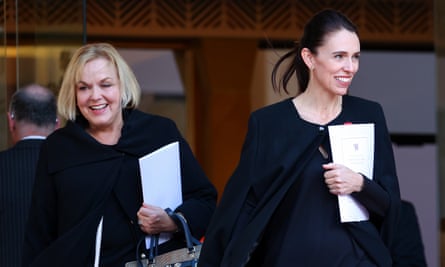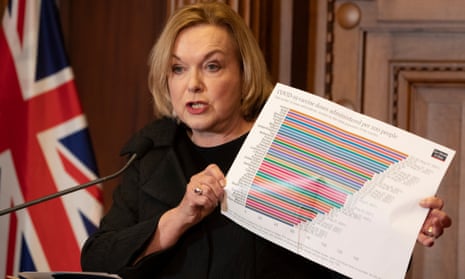“There are three ways in which opposition leaders end being opposition leaders,” the National party’s leader, Judith Collins, says: “one, they give up – well, that’s not happening. Two, they get rolled – that’s not happening, and three, they become prime minister. That’s the one I’m after.”
Collins may be resolute in her desire to bag the country’s top leadership role, but the opposition’s dismal ratings are hard to ignore. Recent polls show the party’s ratings have slumped to 23%, Collin’s preferred prime minister ranking is trailing that of prime minister Jacinda Ardern by 39 points, and the leader of the smaller rival right-wing Act party has overtaken her in the popularity contest.
Despite this, Collins refuses to throw in the towel, which is no surprise to Lara Greaves, the co-director of the Public Policy Institute at the University of Auckland.
“This is who she is as a person – she is a battler, she is stubborn … she sticks with things.”
But it is also unlikely that many would want her job, Greaves adds. “If you’re sitting there as a potential National leader, are you going to be tarnished through no fault of your own, because the government’s still quite popular? … Timing is everything.”

But timing has not been on National’s side in the past 18 months. Ben Thomas, a press secretary during the former National government, points out that the party’s ratings were good before the pandemic – enough so that they could have relegated the Labour coalition government to a one-term wonder in last October’s election.
But when Covid arrived, the country rallied behind its government – a well-documented phenomena across the globe. Being an opposition party during a crisis is a difficult place to be, Greaves says, and more so in New Zealand where the government has “objectively done extremely well”.
National did not calibrate quickly enough as opposition during the early days of the pandemic, despite some good work pointing out problems within the health system and the rollout of personal protective equipment, Thomas says.
Then, just months out from the election, National cycled through three leaders and faced criticism of in-fighting and disunity.
“It was the kind of disunity the public was never going to vote for, compared to a competent government that seemed to be managing the biggest crisis in the world at the time.”
Come election time, the party’s votes tanked, and the Labour government stormed its way to an overwhelming majority.
“They started losing old people support, who are really their core, but are also the people most at risk from Covid and who probably felt the most personal gratitude to Ardern as prime minister,” Thomas says.
Since then, the party has focused too heavily on distracting topics, including what Thomas calls “quick-sugar hit” culture war issues. “It’s part of an outdated, conservative playbook, one that doesn’t really fit in with the electorate as it is today.”
In recent months, both the party and Collins have been panned for voting against a bill banning gay conversion practices, for sparking inflammatory debate about New Zealand’s Māori name Aotearoa, and for piling on scientist and pandemic communicator Siouxsie Wiles.
A rising rival
Collins, who gives little away, appears unperturbed by her dismal polling.
“It’s two years out from the election. So it means very little,” Collins tells the Guardian during an interview in her Beehive office. “Polls are always an historic snapshot of what happened last week.”
She concedes that the party has spent “far too much time having all sorts of things going on within the National party and talking about ourselves.”
That is going to stop, she says, adding that she made this clear to her team when she became leader last year.
But that doesn’t seem to have worked, and the failure is reflected in public opinion. Act’s leader David Seymour has surged on ahead of Collins in the latest Colmar Brunton poll and jumped to his highest ever ranking at 11%.
When asked how Collins felt about Seymour overtaking her, she remains unflappable. “It’s very easy for a smaller party to be able to grab attention for various things.”
Both parties released their Covid recovery plans last week. It was the first sign that consensus was fracturing over the government’s elimination strategy, which had kept the country largely Covid-free until the most recent outbreak.
The difference is, Collins says, is that National is doing “the big policy work”, while Act is putting out “a five point wishlist”.

“There is nothing wrong with what they have put out, but it’s not a plan, ours is a fully thought out, expert reviewed plan. Five bullet points ain’t a plan.”
Thomas agrees that minor parties such as Act are afforded more opportunity to grab attention on fringe issues – something a mainstream party such as National must be cautious about.
“[Act] can be much more definitive about reactionary tactics than National can, so what National found was it was absolutely failing to win back those middle voters that had deserted it for Labour, but it was also losing voters on the right to Act.
Still, with two years to go until the election, and the government pivoting away from its ambitious, successful and popular elimination strategy – the party’s fortune could change, Thomas said – but it will take work.
“All of the National MPs should just be buckling down in their portfolios, paying attention to what the government is doing, poking on it, finding holes, pulling on those threads.
“One, so they are ready to take over should they find themselves in government, and two, so they are in engaging in the mainstream debate, which Judith Collins for most of this year has not been doing.”
